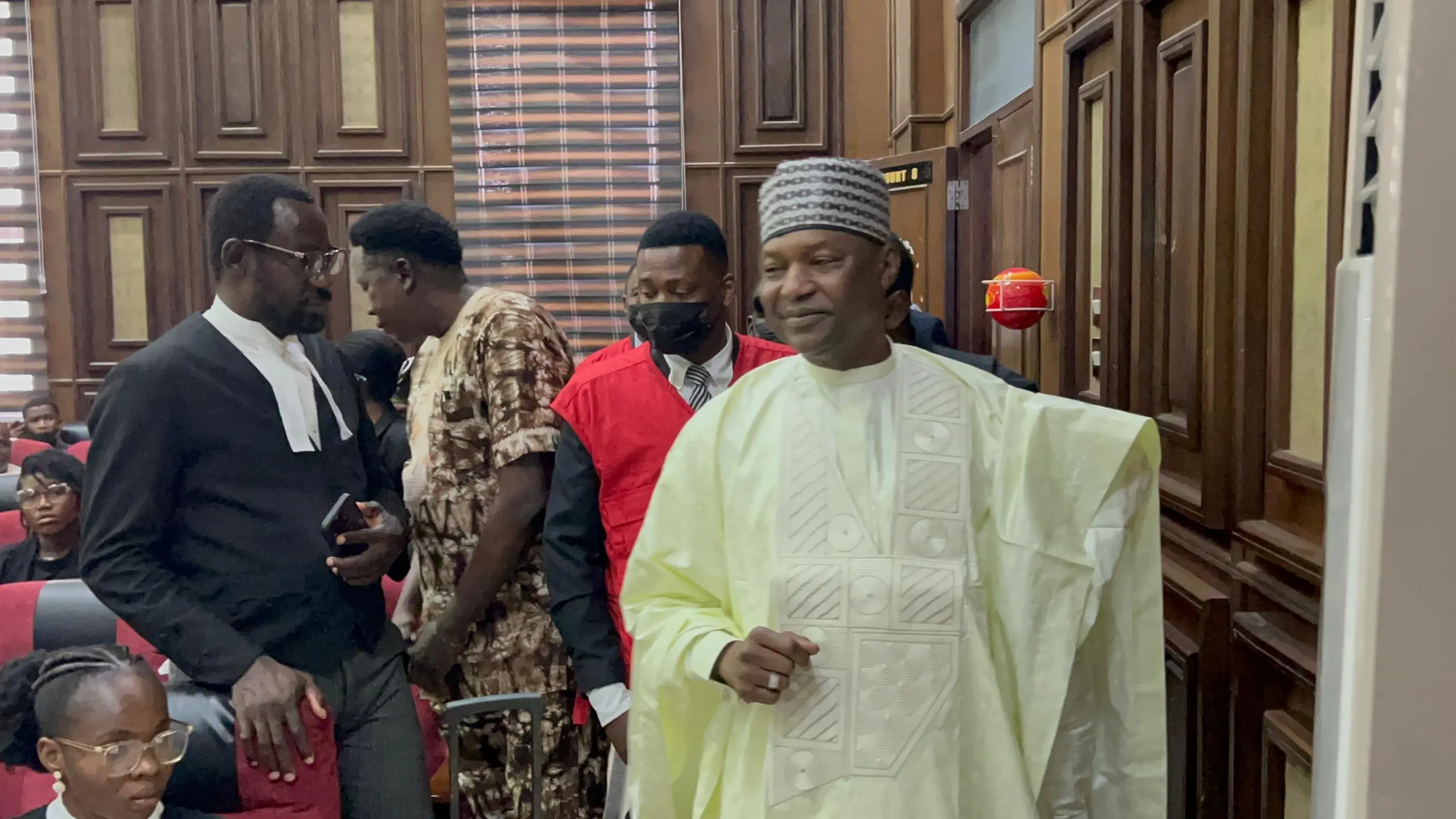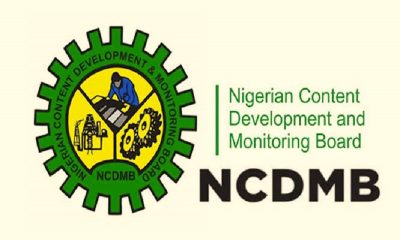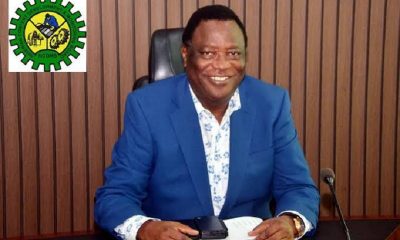General
Nigeria, Ghana Sign MoU on Local Content Regulations

By Adedapo Adesanya
Nigeria and Ghana have signed a Memorandum of Understanding, (MoU) towards developing and deepening local content regulations in Ghana’s upstream petroleum sector.
The signing ceremony took place on the sidelines of the 2024 Annual Local Content Conference and Exhibition held at Takoradi, Ghana between the Nigerian Content Development and Monitoring Board (NCDMB) and the Petroleum Commission Ghana (PCG).
The deal is valid for three years and is centred on the desire to build synergies through information sharing and the transfer of skills of mutual interest and benefits.
Under the MoU, NCDMB will offer PCG strategic advice and guidance in the areas of laws, frameworks, knowledge exchange, procedures for baseline study, data collection on capacities that exist in Ghana, design of strategic plans for local content implementation in Ghana and other capacity development initiatives.
The MoU would also foster collaboration, provide opportunities for global experience, and facilitate the advancement of knowledge, leading to local content development in the upstream petroleum sector.
In addition, NCDMB will offer technical support in the development of the framework for the formulation of regulations and policies for PCG Local Content laws.
NCDMB was established in 2010 by the Nigerian Oil and Gas Industry Content Development, NOGICD, Act, and is mandated to monitor, guide, develop, and promote local content practice in the Nigerian oil and gas sector and linkage sectors.
On the other hand, the PCG was established by the Petroleum Commission Act, 2011 (Act 821) to regulate and manage the utilisation of petroleum resources and coordinate the policies in the upstream petroleum sector under the laws of the Republic of Ghana.
NCDMB had signed a similar agreement with the Technical Secretary of the National Content Monitoring Committee of Senegal (ST-CNSCL) in February 2022. The ST-CNSCL is the agency responsible for the coordination and supervision of the development and implementation of local content strategies in the Senegalese oil and gas sector.
Speaking earlier at the conference in Ghana, the Executive Secretary of NCDMB, Mr Felix Omatsola Ogbe, urged African oil and gas service companies to collaborate among themselves and leverage their unique capabilities.
“This approach would grow African local content sustainably and help meet the aspirations of the African Continental Free Trade Area (AfCFTA),” he noted.
He expressed delight at the collaborative spirit displayed by African countries, noting that “this event is a testament to our unwavering commitment to fostering strategic partnerships and driving sustainable growth within our sector.”
Commenting on the theme of the conference, Attracting E&P Investments to Boost Local Content: New Pathways, the Executive Secretary underscored the necessity for innovative approaches and collaborative efforts to unlock Africa’s hydrocarbon resources, estimated at over 125 billion barrels, accounting for about 10 per cent of global reserves.
He reiterated the role of NCDMB as a business enabler, supporting the development of an efficient indigenous supply chain and delivering quality service competitively in the oil and gas industry.
Reflecting on NCDMB’s achievements, Engr. Ogbe noted significant progress in local content development, with an increase from less than 5 per cent in 2010 to 54 per cent in 2023, attributing the growth to the robust NOGICD Act, strategic implementation by the Board and collaboration by industry stakeholders.
He further highlighted the importance of economies of scale in attracting new investments and optimizing capacity utilisation in the exploration and production value chain.
He also celebrated the establishment of the African Energy Bank by the African Petroleum Producers Organization (APPO) and the African Export-Import Bank (Afreximbank).
The bank is expected to fund major oil and gas projects across the continent, mitigating the reluctance of Western financial institutions to support new investments in the sector.
General
NISO Attributes Electricity Woes to Inadequate Gas Supply

By Adedapo Adesanya
The Nigerian Independent System Operator (NISO) has attributed the poor power supply facing a considerable number of Nigerians to inadequate gas supply to thermal power plants.
Business Post reports that epileptic power supply has plagued consumers in Lagos, Oyo, Abuja, and Osun, among others, this month, leading to worries. Also, some businesses have recorded losses due to the epileptic power supply in their areas.
In a statement posted on its X handle, NISO disclosed that average available generation on the national grid currently stands at about 4,300 megawatts (MW), with the low output primarily attributed to gas supply constraints.
The system operator noted that thermal power plants, which account for the dominant share of Nigeria’s electricity generation mix, require an estimated 1,629.75 million standard cubic feet (MMSCF) of gas per day to operate at optimal capacity. However, as of February 23, 2026, actual gas supply to the plants was approximately 692.00 MMSCF per day.
The available supply represents less than 43 per cent of the daily gas requirement, resulting in constrained generation output and reduced electricity allocation to Distribution Companies (DisCos).
NISO, which independently manages the nation’s electricity grid, explained that any disruption or limitation in gas supply directly affects available generation capacity and overall grid output, given the heavy reliance on thermal plants.
It added that when total system generation drops significantly, the operator is compelled to implement load shedding across the network while dispatching available energy in line with allocation percentages approved under the Multi-Year Tariff Order (MYTO) framework of the Nigerian Electricity Regulatory Commission (NERC), to maintain grid stability and prevent system disturbances.
While expressing regret over the inconvenience to electricity consumers and market participants, NISO said it is working closely with relevant stakeholders to restore full energy allocation once gas supply improves and generation capacity returns to normal levels.
General
EFCC Re-Arraigns ex-AGF Malami, Wife, Son Over Alleged Money Laundering

By Adedapo Adesanya
The Economic and Financial Crimes Commission (EFCC) has re-arraigned former Attorney-General of the Federation (AGF), Mr Abubakar Malami (SAN), his wife, Mrs Asabe Bashir, and son, Mr Abdulaziz Malami, on money laundering charges.
They were brought before Justice Joyce Abdulmalik of the Federal High Court in Abuja, following the re-assignment of the case to the new trial judge.
Upon resumed hearing, EFCC’s lawyer, Mr Jibrin Okutepa (SAN), informed the court that the matter was scheduled for defendants’ re-arraignment.
“The matter is coming before your lordship this morning for the very first time. I will be applying for the plea of the defendants to be taken,” he said.
Mr Okutepa equally applied that the sums listed in Counts 11 and 12 be corrected to read N325 million instead of N325 billion for Count 11, and N120 million instead of N120 billion for Count 12.
When it was not opposed by the defence lawyer, Mr Joseph Daudu (SAN), Justice Abdulmalik granted the oral application by Mr Okutepa.
The defendants, however, pleaded not guilty to the 16 counts preferred against them by the anti-graft agency bordering on money laundering.
Justice Obiora Egwuatu had, on February 12, withdrawn from the case shortly after the civil case filed by the EFCC was brought to him.
The case was formerly before Justice Emeka Nwite, who sat as a vacation judge during the Christmas/New Year break.
After the vacation period, the CJ reassigned the cases to Justice Egwuatu, who had now recused himself, before it was reassigned to Justice Abdulmalik.
The former AGF, his wife, and son were earlier arraigned before Justice Nwite on December 30, 2025.
While Malami and his son were remanded at Kuje Correctional Centre, Asabe was remanded at Suleja Correctional Centre before they were admitted to N500 million bail each, on January 7, with two sureties each in the like sum.
General
INEC Shifts 2027 Presidential, N’Assembly Elections to January 16

By Adedapo Adesanya
Nigeria will hold next year’s presidential and National Assembly elections a month earlier than planned, after the Independent National Electoral Commission (INEC) revised the polling schedule.
The elections will be held on January 16, instead of the previously announced date of February 20, INEC said in an X post, signed by Mr Mohammed Kudu Haruna, National Commissioner and Chairman, Information and Voter Education Committee.
There were also changes to the Governorship and State Houses of Assembly elections initially fixed for Saturday, March 6 2027, in line with the Electoral Act, 2022, have now been moved to Saturday, February 6, 2027.
The electoral commission said the changes were caused by the enactment of the Electoral Act, 2026 and the repeal of the Electoral Act, 2022, which introduced adjustments to statutory timelines governing pre-election and electoral activities.
“The Commission reviewed and realigned the schedule to ensure compliance with the new legal framework,” it said.
INEC said party primaries (including resolution of disputes) will commence on April 23, 2026 and end on May 30, 2026, after which Presidential and National Assembly campaigns will begin on August 19, 2026, while Governorship and State Houses of Assembly campaigns will begin on September 9, 2026.
It noted that campaigns will end 24 hours before Election Day, and political parties have been advised to strictly adhere to the timelines.
INEC also stated it will enforce compliance with the law.
The electoral body also rescheduled the Osun Governorship election which was earlier scheduled for Saturday, August 8 2026, by a week to Saturday, August 15, 2026.
INEC noted that some activities regarding the Ekiti and Osun governorship elections have already been conducted, and the remaining activities will be implemented in accordance with the Electoral Act, 2026.
Speaking at a news briefing in Abuja two weeks ago, the chairman of INEC, Mr Joash Amupitan, expressed the readiness of the commission to conduct the polls next year.
The timetable issued by the organisation for the polls at the time came when the federal parliament had yet to transmit the amended electoral bill to President Bola Tinubu for assent.
Later that week, the Senate passed the electoral bill, reducing the notice of elections from 360 days to 180 days, while the transmission of results was mandated with a proviso.
-

 Feature/OPED6 years ago
Feature/OPED6 years agoDavos was Different this year
-
Travel/Tourism10 years ago
Lagos Seals Western Lodge Hotel In Ikorodu
-

 Showbiz3 years ago
Showbiz3 years agoEstranged Lover Releases Videos of Empress Njamah Bathing
-

 Banking8 years ago
Banking8 years agoSort Codes of GTBank Branches in Nigeria
-

 Economy3 years ago
Economy3 years agoSubsidy Removal: CNG at N130 Per Litre Cheaper Than Petrol—IPMAN
-

 Banking3 years ago
Banking3 years agoSort Codes of UBA Branches in Nigeria
-

 Banking3 years ago
Banking3 years agoFirst Bank Announces Planned Downtime
-

 Sports3 years ago
Sports3 years agoHighest Paid Nigerian Footballer – How Much Do Nigerian Footballers Earn


















